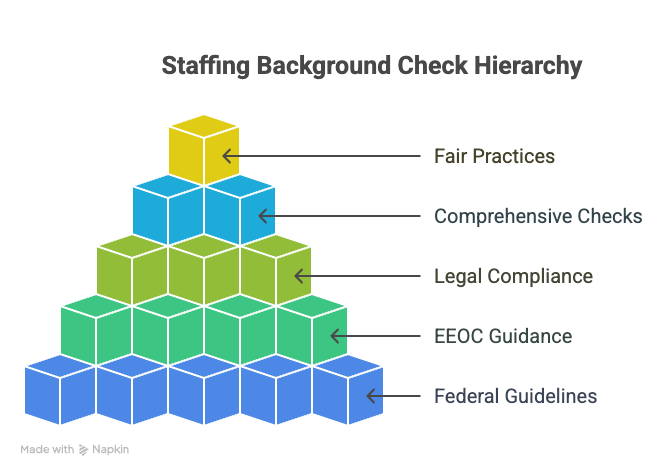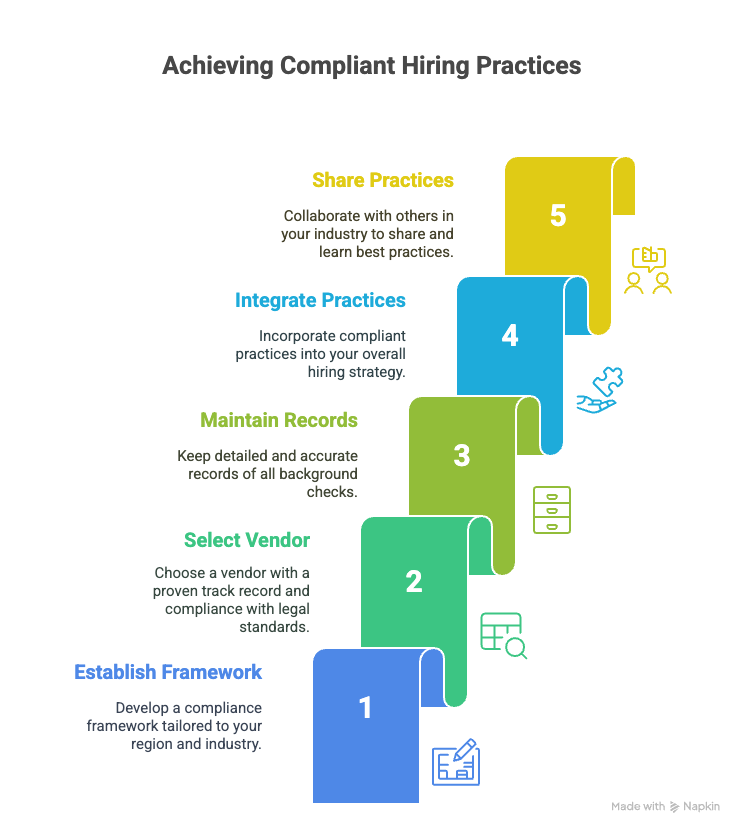Navigating the complex landscape of background checks is crucial for staffing agencies focused on responsible recruitment. In a world where compliance and due diligence go hand in hand, understanding these laws can protect your agency from potential liabilities and streamline your hiring process. This guide is your ultimate resource on staffing background check requirements, covering everything from state-dependent laws to avoiding negligent hiring lawsuits.
Key Takeaways
- Background checks are crucial for staffing agencies to protect both clients and the agency's reputation.
- Federal and state laws require compliance with varying background check standards, including the Fair Credit Reporting Act.
- "Ban-the-box" laws differ by state, requiring staffing agencies to adapt their hiring practices to remain compliant.
- Avoid negligent hiring lawsuits by developing thorough screening processes and keeping detailed documentation for legal protection.
- Regularly update background screening practices with proper training, clear policies, and the use of compliance tools for an effective and lawful hiring process.
Introduction
Background checks are more than just a formality in the staffing industry. They serve as the backbone of building a reliable workforce. For staffing agencies, these checks ensure that candidates meet a standard of trustworthiness before they set foot in a client's workplace. But why are they so critical?
In a staffing environment, the workers you place reflect on your agencyâs credibility. Without proper vetting, you risk putting your clients in harm's way and exposing your agency to legal setbacks. Compliance with background check laws is not just about avoiding finesâit's about upholding the integrity of your service.
This guide explores staffing background check essentials, including how diverse state laws can affect your hiring process. It will arm you with the knowledge to maintain compliance and uphold best practices in staffing background checks. Whether you're familiar with the terrain or new to it, this exploration will make sure your agency stands on solid legal ground.
Understanding Staffing Background Check Requirements
Federal guidelines lay the foundation for employment background checks. The Equal Employment Opportunity Commission (EEOC) offers guidance to help employers make informed hiring decisions without infringing on applicants' rights. You're tasked with balancing fair hiring practices with your need to protect clients and your business's reputation.

The core of "staffing background check requirements" involves thoroughness and adherence to legal standards. Background checks are not merely about checking criminal records. They can include verifying previous employment, education, professional licenses, and more, depending on the job's demands. Each step must comply with the Fair Credit Reporting Act (FCRA). This federal law requires that you notify candidates of background checks and get their consent. It ensures candidates have rights, like disputing inaccurate data, thus maintaining fair assessment standards.
For staffing agencies, understanding these requirements isn't optional. Background checks must be comprehensive yet compliant, balancing the need for information with legal obligations. How do your processes measure up to these federal standards? Addressing that question is key to protecting your agency from potential legal pitfalls while maintaining the integrity of your hiring process.
State Ban-the-Box Laws
"Ban-the-box" laws are regulations that restrict employers from asking about a candidate's criminal history on initial job applications. They aim to create fair job opportunities for individuals with criminal records by delaying background inquiries until later in the hiring process. This approach helps candidates to be considered based on their qualifications first, rather than being immediately excluded.
States vary widely in how these laws are implemented. Some apply only to public sector jobs, while others extend to private employers. For example, California's law covers both sectors and prohibits employers from asking about criminal history until after a conditional offer is made. In contrast, states like Georgia apply the rule only to public employment.
For staffing agencies, navigating these laws is crucial. Agencies must adjust their application procedures and interview processes to comply with local regulations. Ignoring these laws can lead to penalties and damage an agencyâs reputation. Therefore, you need to understand specific requirements in each state where you operate.
Consider consulting legal experts or using compliance software to ensure your practices align with state laws. Regular training for your staff can help maintain compliance and reduce the risk of discrimination claims. By staying informed and adapting, you can ensure fair hiring practices and avoid legal pitfalls.
Avoiding Negligent Hiring Lawsuits
Negligent hiring lawsuits arise when an employee's actions harm someone, and itâs proved that the employer failed in their duty to conduct a reasonable background check. These lawsuits can lead to hefty legal fees, damage to your companyâs reputation, and even financial liability. As a staffing agency, ensuring a safe workplace for both your clients and their employees is non-negotiable.
First, understand what makes a hire "negligent." It usually means that you hired someone who, if properly vetted, would have been seen as a potential risk. For example, placing someone with a history of theft in a position involving cash handling can be grounds for a negligent hiring claim.
To mitigate these risks, implement a thorough and compliant screening process. Conduct comprehensive background checks that align with federal and state regulations. Make sure these checks include criminal history, work history, and, when applicable, reviews of driving records or drug testing.
Consider a real-world case: a staffing agency recently faced a lawsuit after providing a temp worker to a logistics company. The worker, who was not thoroughly vetted, caused a serious accident due to a history of reckless driving. The agency had to settle due to the oversight in their screening process.
Consistently document all background check processes. Detailed records can protect you in the event of a legal challenge. Show that you took the necessary steps to screen candidates according to legal guidelines.
Ask yourself: Are your current processes thorough enough to prevent negligent hiring? Regularly review and update your screening policies. This will not only shield you legally but will build trust with your clients by ensuring that they receive well-vetted and qualified candidates.
Compliant Background Screening Practices
Creating a compliance framework is the first step towards aligning your hiring process with legal requirements. Start by understanding the specific regulations that apply to your region and industry. Develop a checklist that ensures youâre following both state and federal laws. This framework should be regularly updated to reflect any legal changes.
When selecting a vendor for background checks, choose those with a proven track record. Look for services that provide comprehensive checks while adhering to legal standards. Verify that they are compliant with the Fair Credit Reporting Act (FCRA) and that they understand regional regulations. A good vendor will also provide user-friendly reports that you can easily interpret and use.
Documentation and record-keeping are crucial. Maintain accurate and detailed records of all background checks performed. This is important for both audits and potential legal defenses. Ensure you document the processes you follow, including how you handle any adverse information. These records can demonstrate your due diligence in maintaining compliance.

Think about how these practices fit into your overall hiring strategy. How would consistent documentation and vendor selection enhance your agency's integrity? By integrating these practices into your routine operations, you reduce risk and improve the efficiency of your hiring process. Reach out to others in your industry to share practices and learn from each otherâs experiences.
Common Challenges and How to Overcome Them
Keeping up with regulatory changes is no small feat. Laws around background checks can shift frequently, leaving staffing agencies scrambling to stay compliant. To manage this, subscribe to industry newsletters and consider consulting legal professionals familiar with employment law. They can help you navigate changes as they occur.
Data privacy adds another layer of complexity. You need to strike a balance between conducting thorough background checks and respecting candidates' privacy rights. The Fair Credit Reporting Act (FCRA) sets clear rules. Make sure to provide disclosure and gain written consent before conducting checks. This keeps you transparent and builds trust with candidates.
Handling adverse information from background checks requires good judgment. When negative data surfaces, don't rush to decisions. Evaluate the relevance of the information to the job. Does it directly impact the candidateâs ability to perform the duties? Engage the candidate, provide an opportunity for them to explain, and ensure decision-making is fair and unbiased.
These challenges can be daunting, but they aren't insurmountable. With a proactive approach, ongoing education, and the right partners, you can maintain a compliant and efficient background screening process.
Best Practices
Training is essential. Equip your staff with comprehensive training programs focused on the legalities of background checks. It's vital to ensure everyone understands both federal and state requirements. Regular workshops and seminars can keep your team informed about current laws and industry practices. This proactive approach can mitigate the likelihood of compliance slips.
Policies are the backbone of compliance. Develop clear, written policies that outline your agency's procedures for conducting background checks. These should cover every step, from obtaining consent and performing the check, to handling the results. A well-documented policy provides a clear roadmap and minimizes confusion.
Technology can be your ally in the compliance process. Use software tools tailored for background screening. These systems can automate many parts of the process, such as tracking changes in laws, managing consent forms, and storing records securely. They help ensure you adhere to necessary timelines and reduce the risk of human error.
Incorporating these best practices requires effort, but the payoff is a more efficient, compliant, and less risky staffing operation. Are your current practices up to the task? Consider the benefits of integrating training, policy development, and technology into your compliance strategy.
Conclusion
Understanding and adhering to background check laws is essential for staffing agencies. This ensures compliance and minimizes legal risks. Agencies should take proactive steps by regularly reviewing and updating their procedures. Stay informed about changes in the law and train your team accordingly. A proactive approach today will safeguard your agency's future. Stay ahead by making compliance a priority.
Frequently Asked Questions (FAQs)
What Federal Laws Govern Background Checks for Staffing Agencies?
Staffing agencies must comply with the Fair Credit Reporting Act (FCRA) when conducting background checks. The FCRA requires obtaining written consent from job applicants before conducting a background check and providing them with a copy of the report and their rights if adverse action is taken.
How Do State Laws Affect Background Check Requirements for Staffing Firms?
State laws can impose additional restrictions on background checks, such as limiting the type of information that can be included, setting specific procedures for obtaining consent, or requiring notices about the use of background information. Always check state-specific regulations.
What Are the Penalties for Violating Background Check Laws?
Penalties for violating background check laws, such as the FCRA, can include fines, damages to affected individuals, and lawsuits. Companies might pay statutory damages ranging from $100 to $1,000 per violation, plus potential punitive damages.
How Can Staffing Agencies Ensure Compliance with FCRA and EEOC Laws?
You should implement clear policies and regular training. Maintain accurate records, provide applicants with necessary disclosures, and ensure the information used is job-related and consistent with business necessity. Regularly review procedures for compliance updates.
Are There Industry-Specific Background Check Laws Staffing Agencies Must Follow?
Some industries, like healthcare or finance, may have specific regulations regarding background checks. For instance, healthcare positions often require checks for abuse registries, while finance roles may scrutinize credit histories. Check industry-specific guidelines.
What Steps Should You Take Before Conducting a Background Check?
Obtain written consent from the applicant and clearly explain the process. Ensure all requested information is relevant to the position applied for. Keep applicants informed about their rights.
Can an Applicant Challenge the Results of a Background Check?
Yes, applicants have the right to dispute inaccurate or incomplete information. Staffing agencies should provide instructions on how to file disputes and cooperate in resolving them promptly.
How Long Should a Staffing Agency Retain Background Check Records?
Retain records for at least one year or longer if state laws or company policy requires. This helps defend against discrimination claims or other legal actions. Proper storage and disposal are essential to protect applicant privacy.
What Information Is Typically Included in a Background Check?
Background checks may include criminal history, employment verification, education verification, and credit reports if relevant to the job. Always ensure the information is pertinent to the position.
Definitions
Background Check
A background check is a review of a candidateâs personal, criminal, and professional history to evaluate their suitability for a job. It often includes criminal records, employment history, education verification, and license confirmation. Staffing agencies use this process to reduce hiring risks and confirm that candidates meet client requirements.
Fair Credit Reporting Act (FCRA)
Ban-the-Box Law
Ban-the-box laws prevent employers from asking applicants about their criminal history at the start of the hiring process. These laws aim to give individuals with prior convictions a fair chance to be evaluated on their qualifications. Many states enforce this rule differently, so your compliance may vary depending on location.
Negligent Hiring
Negligent hiring occurs when an employer hires someone without performing a proper background check, and that person later causes harm that could have been predicted. For staffing agencies, this can lead to legal and financial liability. Preventing this involves thorough and documented screening practices.
Equal Employment Opportunity Commission (EEOC)
The EEOC is a federal agency that enforces laws preventing discrimination in the workplace. It offers guidance on how to conduct background checks fairly, ensuring that decisions do not unjustly impact individuals based on race, gender, age, or criminal history. Following EEOC guidelines helps create a fair hiring process.
References
- https://gp1.com/heres-a-few-background-check-statistics-for-2025/
- https://www.myshortlister.com/insights/background-check-statistics
- https://cfirst.io/how-2025s-background-check-trends-will-make-you-rethink-hiring/

GCheck Editorial Team
Meet the GCheck Editorial Team, your trusted source for insightful and up-to-date information in the world of employment background checks. Committed to delivering the latest trends, best practices, and industry insights, our team is dedicated to keeping you informed.
With a passion for ensuring accuracy, compliance, and efficiency in background screening, we are your go-to experts in the field. Stay tuned for our comprehensive articles, guides, and analysis, designed to empower businesses and individuals with the knowledge they need to make informed decisions.
At GCheck, we're here to guide you through the complexities of background checks, every step of the way.





